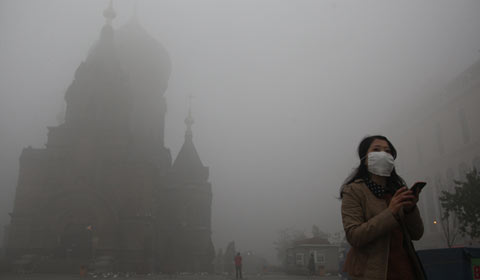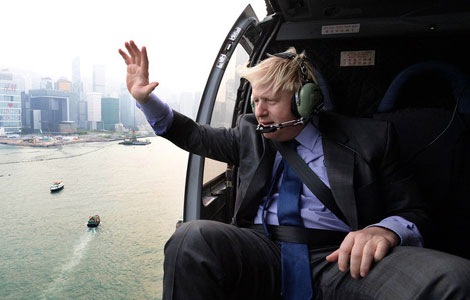Beijing needs to be 'more active' in global security
Updated: 2013-10-22 01:45
By ZHAO YANRONG in Beijing, Cecily Liu in London, and Fu Jing in Brussels (China Daily)
|
||||||||
China needs to play a more active role in global security issues to maintain its expanding economic ties with other countries, especially with key energy partners, analysts said.
They made the remarks against the backdrop of China recently surpassing the United States to become the world's largest oil importer, driven by the demand to fuel the development of the world's second-largest economy and largest population.
According to the US Energy Information Administration, China surpassed the US in September as the world's biggest net oil importer, driven by faster economic growth and strong auto sales. The EIA forecasts such a trend will continue through 2014, The Associated Press reported.
China's oil consumption outstripped production by 6.3 million barrels per day, meaning the country has to import that much to fill the gap, according to the EIA.
As China is in a rapid urbanization and industrialization process, the demand on oil imports is expected to rise in coming years.
China imported 271 million tons of oil in 2012, a 6.8 percent year-on-year increase, despite an economic slowdown, according to the General Administration of Customs.
The value of the imports jumped 12.1 percent from 2011 to $220.67 billion last year due to surging prices, the administration said.
Analysts predicted that oil imports are likely to reach about 285 million tons in 2013, with more than 60 percent of the country's oil consumption dependent on imports, and two-thirds of China's oil will come from overseas markets by 2020, Xinhua reported.
Meanwhile, China's energy security faces external challenges, such as the unstable situation of oil exporters and the uncertainties that have long plagued overseas maritime transportation.
According to the General Administration of Customs, the Middle East is China's biggest oil provider, contributing 49 percent of oil imports from January to October in 2012, and the African continent ranked second, providing about 23 percent in the same period.
Zhou Xinyu, a researcher at Beijing Foreign Studies University, said China's increasing oil importation means greater dependence on other countries, which will "definitely increase its vulnerability".
Zhou said China is trying to increase its influence in the Middle East to support it in undertaking the responsibilities of a major world power.
"China's recent foreign policies witnessed a major change. China is more active in international affairs than in the past, such as its stance on the Syrian issue," Zhou said.
"The Cold War has ended, and no country can expect to expand its influence simply by relying on military actions or ideology. China needs to increase its regional influence through more diversified methods to win the trust of ordinary people," he added.
Shada Islam, director of the Policy of Friends of Europe in Brussels, said China has long stood on the sidelines without seeking a political role, but as it becomes a bigger economic player, it must be more involved in security sectors.
"I don't know whether China will participate more actively in international security, but I think it should," Islam said.
"This is something Chinese policymakers are very aware of, but now it is becoming quite urgent for China to have a say on questions related to global peace and security. In the Middle East and other oil exporting countries, China can play a significant role as a mediator for good," she added.
Islam said Beijing has become a more active participant in discussions to defuse tensions concerning important oil suppliers and cited Iran as an example.
"China is already working for stability, but doing that maybe in a more low-profile way. Beijing may find itself becoming a more important voice on these issues," Islam said.
Elizabeth Sidiropoulos, chief executive of the South Africa Institute of International Affairs, said Africa would love to see China play a constructive role to address tensions and bring peace and security to the African continent.
"The exploration of oil and gas provides huge opportunities for Africa's development, while it is also a major challenge. I think that is important for our external partners to know," Sidiropoulos said, adding that oil exploration had somewhat given ground to corruption, which did not translate into local development.
Sidiropoulos also said internal conflicts over oil may be exacerbated by external factors, such as the substantial security challenges in the Middle East, and Africa does not want to become the next Middle East.
"We already have challenges over resource controlling in Congo, Somalia, South Sudan and Sudan, as well as in Mali. China has really good relations with certain countries. When these countries face serious internal crises, it's important for China to work with them to stabilize the situation," she said.
By the end of June, 1,752 Chinese peacekeepers had been deployed on nine United Nation peacekeeping missions to the Democratic Republic of the Congo, Liberia, Lebanon, South Sudan and Darfur.
Sidiropoulos said that in addition to deploying UN peacekeepers, it is also essential for China to provide systematic security support and resources that African states are looking for.
Christian Le Miere, senior fellow for naval forces and maritime security at the International Institute for Strategic Studies, a military think tank, said it is perfectly feasible for China to be a very positive participant in the international community.
"There are growing overseas interests China has in investments and the welfare of its citizens overseas so, in 2011, we saw the first active deployment of a Chinese warship to the Mediterranean in history, to help with the non-combatant evacuation of Chinese citizens in Libya at the time," Miere said.
Libya is the holder of Africa's largest proved oil reserves and an important contributor to the global supply of crude oil. Before the Libyan domestic crisis began in 2011, China imported roughly 150,000 barrels of crude oil from Libya daily, about 10 percent of Libya's crude exports in 2010, according to Reuters.
During the crisis, Libya's oil reserve regions near the Mediterranean became major battlefields. The Libyan government and opposition both wanted to control those areas, which are important for the country's domestic economy.
The domestic conflict caused the interruption of Libya's oil exports, which also led to an increase of the international oil price by $2.40 per barrel. The conflict put severe pressure on China.
"While, obviously, it didn't demonstrate any interventionism in the domestic situation in Libya, it did demonstrate the growing willingness and ability of the country to deploy its resources overseas to protect its interests," Miere added.
Wang Yizhou, deputy head of the International Studies College at Peking University, urged China to be more creative and flexible in directing its foreign affairs.
"With more common interests created by the much closer economic and resource ties, African countries also have the need to cooperate with China on security issues. For instance, in Tanzania, China works with local military and police forces," Wang said.
Contact the writer at
zhaoyanrong@chinadaily.com.cn
Zhang Fan contributed to this story.
 Teacher killed, two wounded in Nevada middle school shooting
Teacher killed, two wounded in Nevada middle school shooting
 Smog wraps northeast, schools forced to close
Smog wraps northeast, schools forced to close
 Architect looks to the big picture
Architect looks to the big picture
 Teachers, students divided over Gaokao reform plan
Teachers, students divided over Gaokao reform plan
 Dogfight looms over jets
Dogfight looms over jets
 Peak season for fall foliage in Beijing
Peak season for fall foliage in Beijing
 Train carrying carrying oil, gas derails in Canada
Train carrying carrying oil, gas derails in Canada
 30,000 turn out in Beijing Marathon
30,000 turn out in Beijing Marathon
Most Viewed
Editor's Picks

|

|

|

|

|

|
Today's Top News
Teacher killed in Nevada middle school shooting
Obama vows to get website fixed
BOC-NY, IFC sign agreement
US OKs Alibaba structure
UK official looks to China
Beijing needs to be 'more active' in global security
Economy to see 'good ending' in Q4
Border agreement to boost ties
US Weekly

|

|






